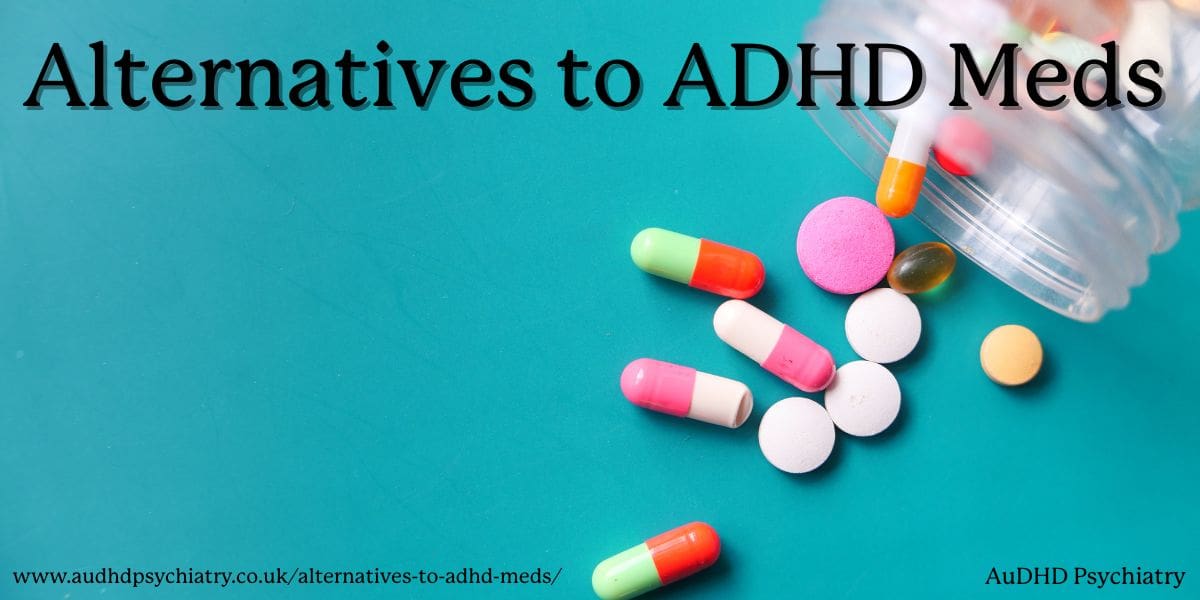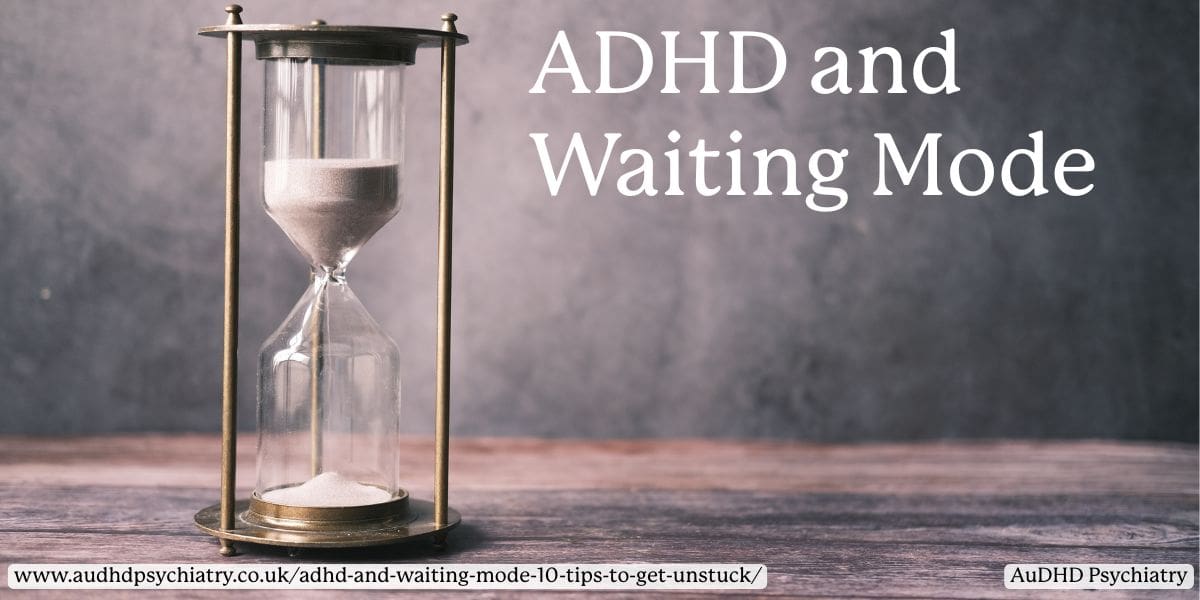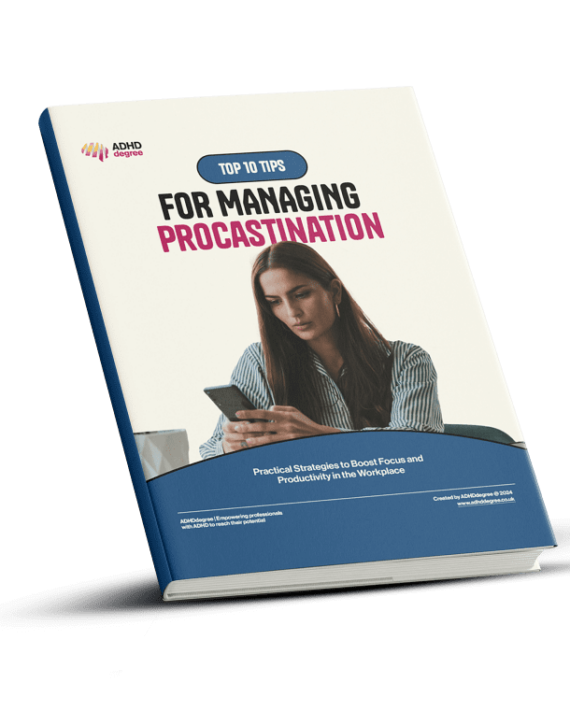For many individuals managing attention deficit hyperactivity disorder (ADHD), medication forms the backbone of their treatment plan. But not everyone responds well to stimulant-based drugs, and some may choose to explore non-pharmaceutical options due to side effects, personal preference, or lack of access. Whether you’re navigating a recent ADHD diagnosis or reassessing your current approach, it’s understandable to seek safer, more sustainable solutions that align with your lifestyle.
This guide explores evidence-based, common alternatives to ADHD medication, covering everything from behavioural interventions and dietary changes to natural supplements and emerging therapies. While no single strategy replaces the clinical effectiveness of prescription drugs for everyone, combining several non-medication approaches can often support symptom management, especially when tailored to your individual needs.
We’ll examine natural treatments for ADHD, highlight their scientific backing (or lack thereof), and provide clear steps for integrating them into a personalised plan. Whether you’re a parent looking for ways to support your child’s ADHD without relying solely on medication or an adult exploring lifestyle changes, this article offers a grounded, practical starting point.
Why Consider Alternatives to ADHD Medication?
Stimulant medications are a first-line treatment for attention-deficit hyperactivity disorder (ADHD), but they don’t work for everyone. Some individuals experience unwanted side effects, such as appetite suppression, sleep problems, mood swings, or elevated anxiety. In others, the benefits of medication may decrease over time, or symptoms may persist despite consistent use. For some, stimulant medicines only address part of the picture, often focusing on attention and impulsivity while leaving emotional regulation or executive functioning issues unaddressed.
When Non-Stimulant Options Are Preferred
Non-stimulant medications or non-pharmaceutical strategies are often considered when stimulant medications aren’t tolerated, when a person has co-existing conditions (such as tics, anxiety, or sleep disorders), or when stimulant use is medically contraindicated. Some individuals may also prefer not to use prescription medication for personal, cultural, or long-term planning reasons. Behavioural, dietary, or lifestyle-based interventions may offer safer or more sustainable support in these cases.
Exploring Broader ADHD Management Strategies
In recent years, ongoing shortages of medications like Adderall have prompted many individuals and families to explore options beyond prescriptions. This shift has highlighted the value of alternative treatments, including dietary changes, natural ADHD remedies, cognitive behavioral therapy, and structured routines. While these approaches may not fully replace pharmacological treatment, they can play a key role in improving daily functioning.
Learn more about medical and non-medical options in ADHD Medication in the UK: Your Essential Guide for 2025.
Behavioural and Parenting Interventions for ADHD
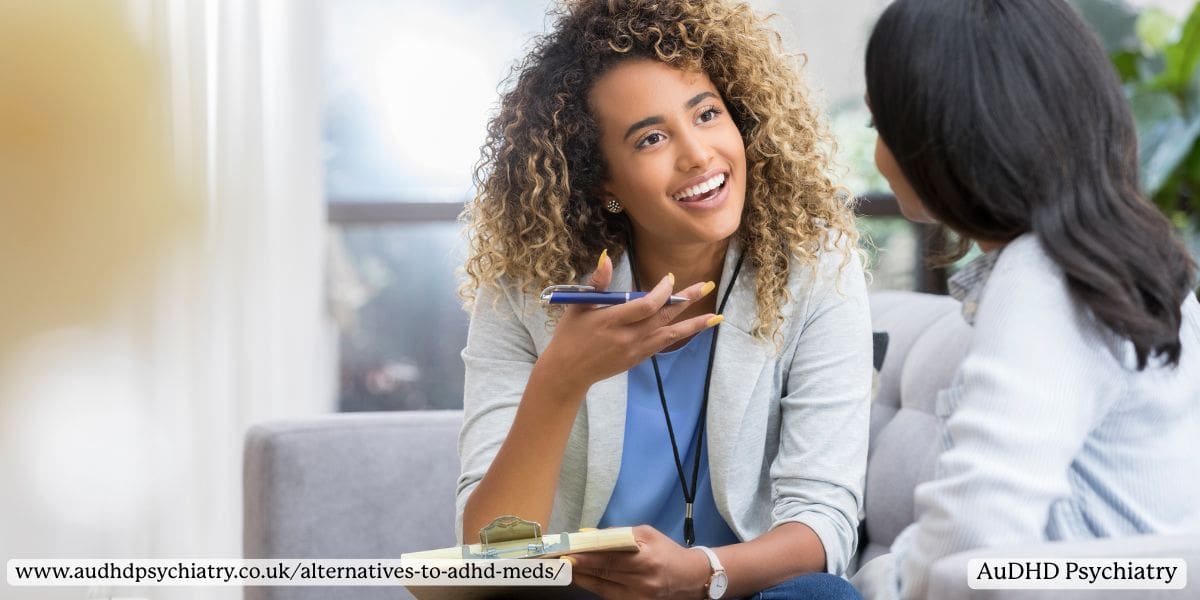
Cognitive Behavioural Therapy (CBT)
CBT is a widely recognised therapy for ADHD that focuses on reframing unhelpful thinking patterns and building coping skills. While initially designed for anxiety and depression, it has been adapted to support individuals with ADHD, particularly older children and adults. CBT can help manage impulsivity, increase emotional control, and reduce feelings of overwhelm by promoting structured approaches to thinking and behaviour.
Executive Function Coaching and Self-Paced Tools
Many people with ADHD experience executive dysfunction, which affects their ability to plan, prioritise, and manage time effectively. Executive function coaching provides practical strategies to build those skills, often through one-on-one guidance. Self-paced digital tools, including task managers, timers, and focus apps, are also widely used to support task initiation and follow-through. There is no specific mix of resources and tools that work the same for every individual managing ADHD, so trial and error are recommended.
Behavioural Strategies for Parents
For younger children, parental involvement is a critical component of behavioural intervention. Techniques such as ABC behaviour tracking (Antecedent–Behaviour–Consequence), visual schedules, and consistent routines can make daily life more manageable. Structured parenting programmes are often delivered through schools, clinics, or online platforms. Support groups for parents may also help reduce stress and offer shared strategies.
Behavioural interventions are especially valuable when medication alone isn’t enough. If you’re a parent who needs more help in supporting your child, this article may help.
ADHD Diet and Nutrition Plans
Families seeking alternatives to ADHD medication commonly explore dietary changes, particularly in younger children. Elimination diets involve removing potential food triggers such as artificial colourings, preservatives, or common allergens like gluten, dairy, or soy. The Feingold Diet, which eliminates synthetic additives and salicylates, has gained attention, though research findings remain mixed. Some children show improvements in behaviour and attention, while others see no effect, making individual testing essential.
Nutrient Deficiencies and ADHD Symptoms
Micronutrients play a critical role in brain development and function. Some studies have linked zinc, magnesium, and iron deficiency to increased severity of ADHD symptoms. Blood testing can help determine whether nutritional supplements are appropriate. Over-supplementation can be harmful, so professional advice is strongly recommended before making dietary changes or introducing high-dose products.
Building a Balanced ADHD-Friendly Diet
Establishing regular mealtimes and ensuring a steady intake of protein, fibre, and omega-3 fatty acids can help support mood stability, focus, and energy levels throughout the day. Reducing processed foods and sugary snacks may help some individuals regulate hyperactivity or emotional outbursts. While no single diet can cure ADHD, balanced diets are an important part of overall well-being and can complement
Herbal and Natural ADHD Supplements That May Help
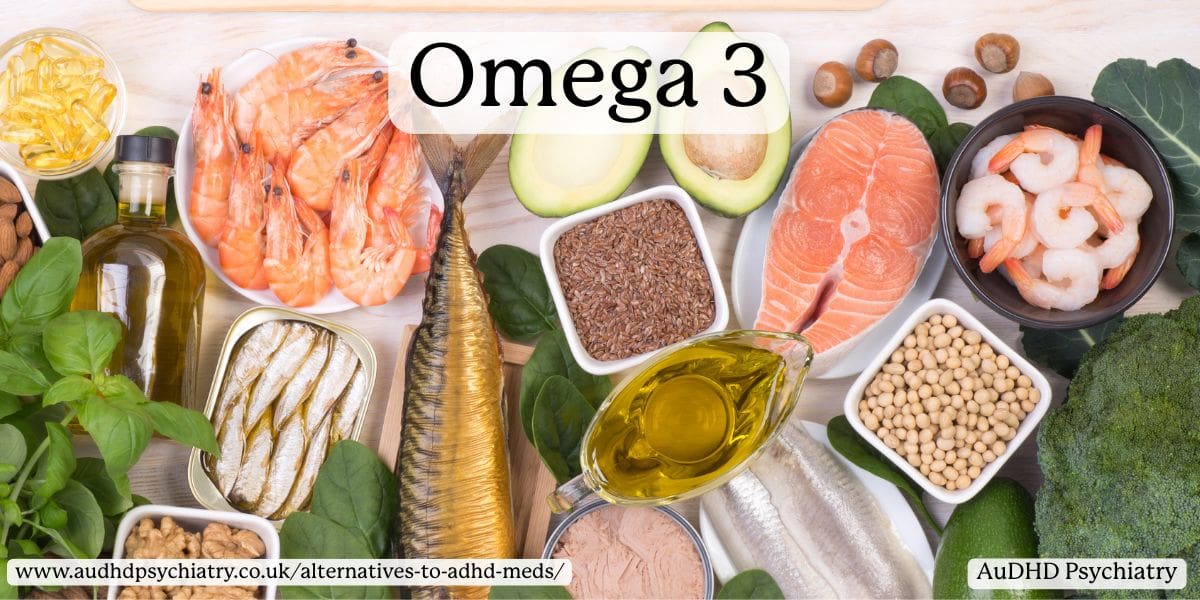
Omega-3 Fatty Acids and Brain Function
Omega-3 fatty acids, particularly EPA and DHA found in fish oil, are essential for brain development. Studies suggest that fish oil supplements may help reduce inattention and impulsivity, especially in children. Products with higher EPA content seem to show the most promise. While the effects are generally mild, omega-3s are considered safe for most people and may offer an accessible supplement option.
Key Minerals: Zinc, Magnesium, and Iron
Low levels of zinc, magnesium, and iron have been found in some individuals with ADHD. These minerals are involved in neurotransmitter regulation and overall brain function. Supplementing may be helpful in individuals with confirmed deficiencies, but inappropriate use can lead to side effects, particularly in children. It’s important to test before adding any mineral supplement to a treatment plan.
Herbal Remedies: What the Evidence Says
Some herbal remedies for ADHD, including Ginkgo biloba, Bacopa monnieri, and ginseng, are marketed as natural stimulants or cognitive enhancers. While some studies report mild improvements in memory or attention, others show little to no effect. Quality control can also vary widely between products. Individuals considering herbal remedies should seek advice from a healthcare provider and use reputable brands with third-party testing.
Over-the-Counter and Herbal Alternatives to ADHD Meds
As stimulant shortages and concerns around controlled substances persist, many people seek non-prescription options to manage their symptoms. Some over-the-counter (OTC) products contain caffeine, amino acids, or nootropic ingredients marketed to improve focus and memory. While these may offer temporary alertness, they are not equivalent to prescribed ADHD medications and may interact with other treatments.
Herbal Stimulants and Cognitive Blends
As we’ve previously shared, products containing natural stimulants for ADHD, such as ginseng, Rhodiola, or Ginkgo biloba, are often sold as focus enhancers. Though some small studies suggest mild benefits, most evidence is anecdotal or lacks clinical depth. Supplements like acetyl-L-carnitine and Pycnogenol are also marketed for ADHD, though scientific reviews often highlight a lack of consistent outcomes.
Safety and Quality Considerations
Many OTC ADHD products are unregulated and may include high doses of active compounds, fillers, or undeclared substances. Always look for third-party tested brands and consult a healthcare provider before starting any supplement, especially when used alongside medication.
To learn how ADHD is managed in complex cases, read Managing ADHD Medication Side Effects.
Movement and Exercise for ADHD Focus
Exercise increases brain activity, improves blood flow, and enhances the release of key neurotransmitters such as dopamine and norepinephrine, both of which are often imbalanced in ADHD. Research shows that regular physical activity may improve attention, reduce hyperactivity, and boost overall emotional regulation.
Structured Routines for Children and Adults
Children with ADHD often benefit from scheduled activity breaks between lessons or tasks. These movement breaks help reduce restlessness and improve concentration. For adults, incorporating aerobic exercise or short activity intervals throughout the day may help maintain mental stamina and improve task initiation.
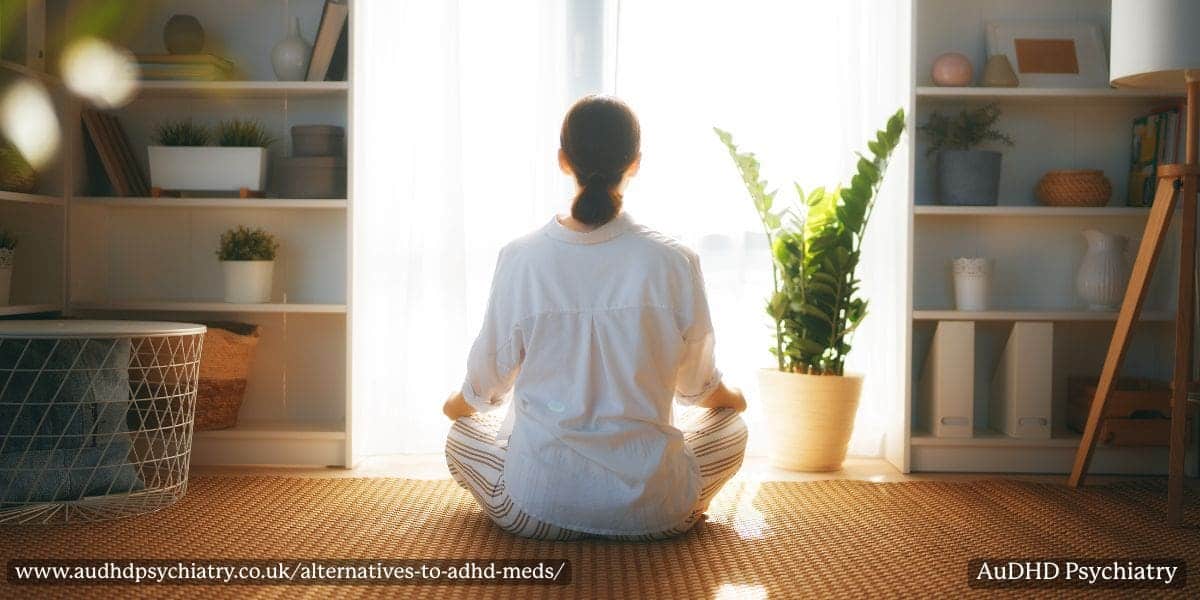
Mind-Body Practices
Gentle practices such as yoga and tai chi combine physical movement with mindfulness and breathwork, supporting emotional regulation and body awareness. These practices are especially beneficial for individuals with ADHD who struggle with stress, getting enough sleep, or sensory sensitivity. For more on this topic, explore The Role of Exercise in Managing ADHD Symptoms – Beyond the Gym.
Meditation, Breathwork, and Mindfulness for ADHD
Mindfulness can help individuals with ADHD improve their awareness of thoughts, sensations, and behaviours. Regular practice may reduce impulsivity and promote emotional regulation. Techniques like mindfulness-based stress reduction (MBSR) and guided meditation are increasingly used as non-drug tools in ADHD care.
Breathwork and Nervous System Regulation
Simple breathing exercises, such as box breathing or paced diaphragmatic breathing, can help regulate the nervous system and reduce emotional reactivity. For children, pairing breathwork with visual tools or counting games can make practice more engaging and accessible.
Apps and Guided Tools for Daily Practice
Many digital tools support the integration of mindfulness into everyday routines. Apps offering guided meditation tools for focus, anxiety, or sleep can help adults and children build consistent habits. These tools may work particularly well when used alongside other behavioural interventions. To explore more about how digital tools support ADHD, see ADHD in the Digital Age: Managing Screen Time and Social Media.
Improving Sleep in Individuals with ADHD
Sleep problems are frequently reported by people with ADHD. Difficulties falling asleep, staying asleep, or waking too early can worsen core symptoms like inattention, irritability, and executive dysfunction. Sleep problems are often under-recognised and may be mistakenly attributed to behaviour alone.
Bedtime Routines and Environmental Adjustments
Creating a consistent evening routine can signal the body to wind down. This might include screen-free time, calming music, or dimmed lighting. Reducing exposure to caffeine and large meals late in the day may also help. Sleep hygiene practices such as regular sleep/wake times and a cool, quiet bedroom environment are essential.
Natural Sleep Aids and Alternatives
Some individuals explore natural sleep aids such as melatonin, valerian, or magnesium supplements to support more restful sleep. While these are widely available, they should be used with guidance, especially for children. Evidence for melatonin in managing ADHD-related sleep delay is more established than for other herbal supplements for ADHD.
Learn more about challenges like this in ADHD and Waiting Mode – 10 Tips to Get Unstuck, which includes strategies for improving regulation and transitions.
ADHD Tech: Digital Tools and Neurofeedback
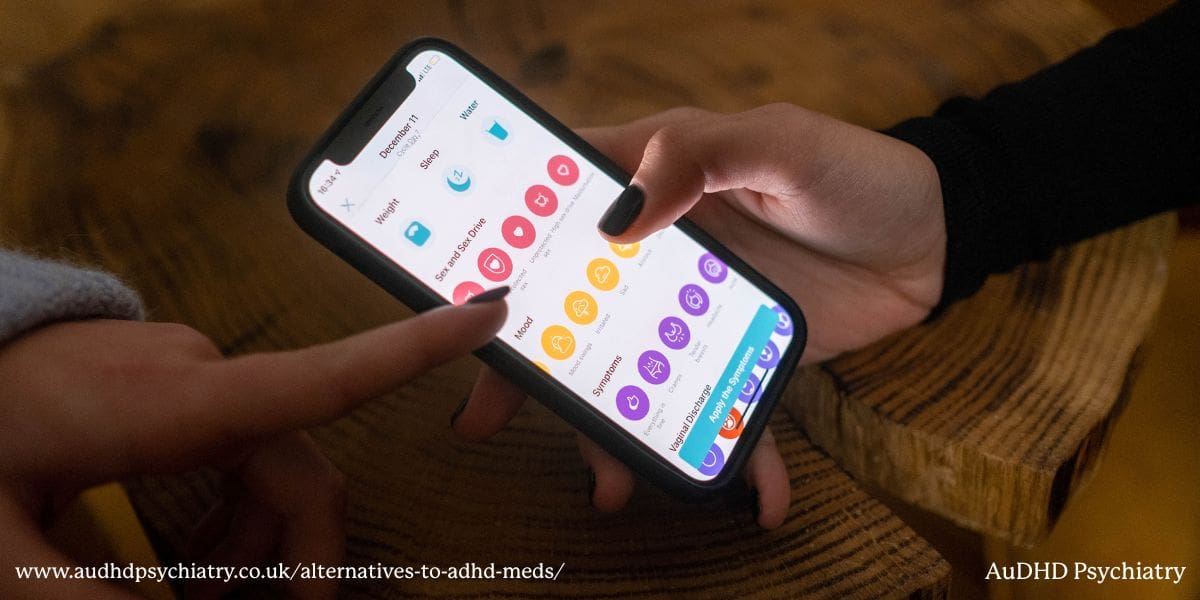
Brain-Training and Feedback-Based Approaches
Technological tools are increasingly used to support ADHD management, particularly for individuals seeking non-pharmaceutical strategies. One of the more advanced options is neurofeedback — a form of biofeedback that teaches users to recognise and regulate their own brain activity. During sessions, individuals complete mental tasks while their brainwaves are monitored in real-time, often with visual feedback. Some research suggests that neurofeedback may lead to improvements in attention, focus, and behavioural regulation, especially in children. However, the evidence is mixed, and the results can vary significantly depending on the provider and protocol used.
Digital Apps for Planning and Focus
Mobile apps and digital platforms have also become valuable tools for people with ADHD. Many of these are designed to improve executive function by offering features like to-do lists, visual reminders, time-blocking calendars, and progress trackers. These tools may follow principles derived from cognitive behavioural therapy (CBT), helping users reinforce helpful routines and reduce disorganisation. While apps can’t replace direct therapeutic support, they can enhance daily structure and provide a sense of control.
Cognitive Games and Support Platforms
Cognitive training games aim to strengthen areas such as working memory, processing speed, and sustained attention. While the clinical backing for these games remains limited, some users report benefits when they are used consistently and in conjunction with other strategies.
For more tools to support daily life with ADHD, visit ADHD Resources and Tools.
Complementary and Controversial ADHD Therapies
Some families explore complementary treatment options such as chiropractic adjustments, craniosacral therapy, or sensory integration therapy to manage ADHD symptoms. These methods are often based on the idea of improving neurological alignment or calming the nervous system. However, there is little high-quality research to support their effectiveness.
Acupuncture and Energy Therapies
Acupuncture is occasionally used to address associated symptoms such as anxiety or sleep disturbances in people with ADHD. While small-scale trials have reported mild benefits, the evidence remains limited and is not yet strong enough to form clinical recommendations. Energy-based therapies such as Reiki, magnetic therapy, or reflexology are also marketed as holistic ADHD treatments but lack scientific evidence.
Assessing Safety and Efficacy
Before committing to any alternative therapies, it’s important to weigh both the potential benefits and the adverse effects, including the risk of delaying more effective interventions. Some complementary approaches may be safe when used alongside traditional treatments, but others can be costly, time-consuming, or misleadingly marketed. Consulting with a qualified healthcare professional ensures that decisions are informed, balanced, and evidence-aware.
Non-Stimulant and Prescription Medication Alternatives
While stimulant medicines remain the most commonly prescribed ADHD treatments, there are several non-stimulant alternatives available. Atomoxetine (Strattera) and extended-release guanfacine (Intuniv ER) are two examples approved in the UK. These medications belong to a different class of medications and may be better suited to individuals who experience negative side effects with stimulants or have co-occurring conditions such as tics, sleep issues, or anxiety.
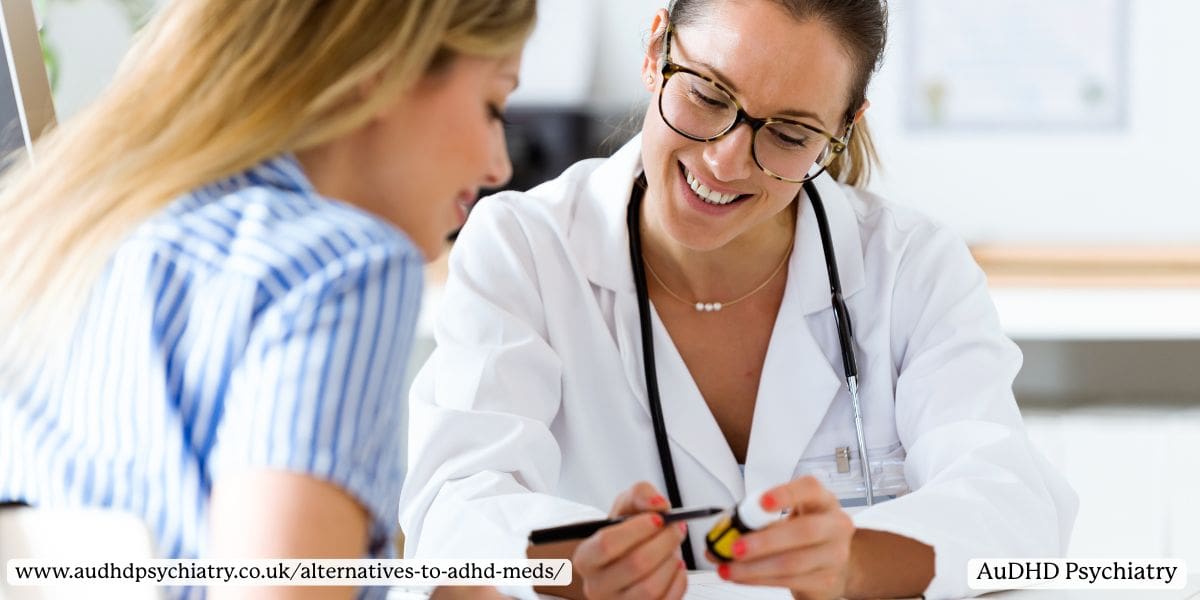
Off-Label and Emerging Options
In some cases, providers may prescribe medications off-label to manage ADHD symptoms. This might include modafinil, which promotes wakefulness, or bupropion, an antidepressant that can enhance dopamine activity. While these options are less commonly used, they may benefit individuals who do not respond to conventional therapies. Because these medications are not specifically licensed for ADHD, treatment must be closely monitored.
Making an Informed Choice
Non-stimulant medications typically take longer to show effects and may involve different drug administration protocols than stimulant medicines. They also carry their own set of possible side effects, including low blood pressure, fatigue, mood changes, or digestive upset. For this reason, careful consultation with a healthcare provider is essential when exploring non-stimulant options, especially for children and young adults.
To find out more about diagnosis and clinical guidance, visit Top Private ADHD Assessment Services for Accurate Diagnosis.
Alternatives to ADHD Meds: Conclusion
ADHD is a complex condition that affects people differently, and the best approach to treatment is not one-size-fits-all. While stimulant medications remain the most common form of intervention, they are not the only option. Individuals who experience unwanted effects, limited results, or personal concerns about prescription use may benefit from exploring non-pharmaceutical strategies.
This guide has outlined a wide range of alternatives to ADHD medication, from behavior therapy and herbal preparations to mind-body practices and dietary interventions. For some, incorporating tools like nutritional supplements, regular exercise, or structured routines can improve focus, reduce stress, and promote better sleep, particularly when tailored to individual needs and monitored by a healthcare professional.
Emerging research continues to investigate the role of essential oils, vitamin supplements, and even elimination diets in ADHD management. While some findings show promise, others require further validation through large-scale scientific studies. It’s important to recognise that many alternative approaches come with limited regulation or evidence, and consulting a qualified ADHD specialist is essential for evaluating important safety information.
Whether you’re considering alternative treatments for your child’s ADHD or reassessing your own care plan, professional input can help you identify the most effective and realistic path forward. If you’re ready to take the next step toward a personalised assessment and treatment strategy, book a private ADHD Assessment today.

